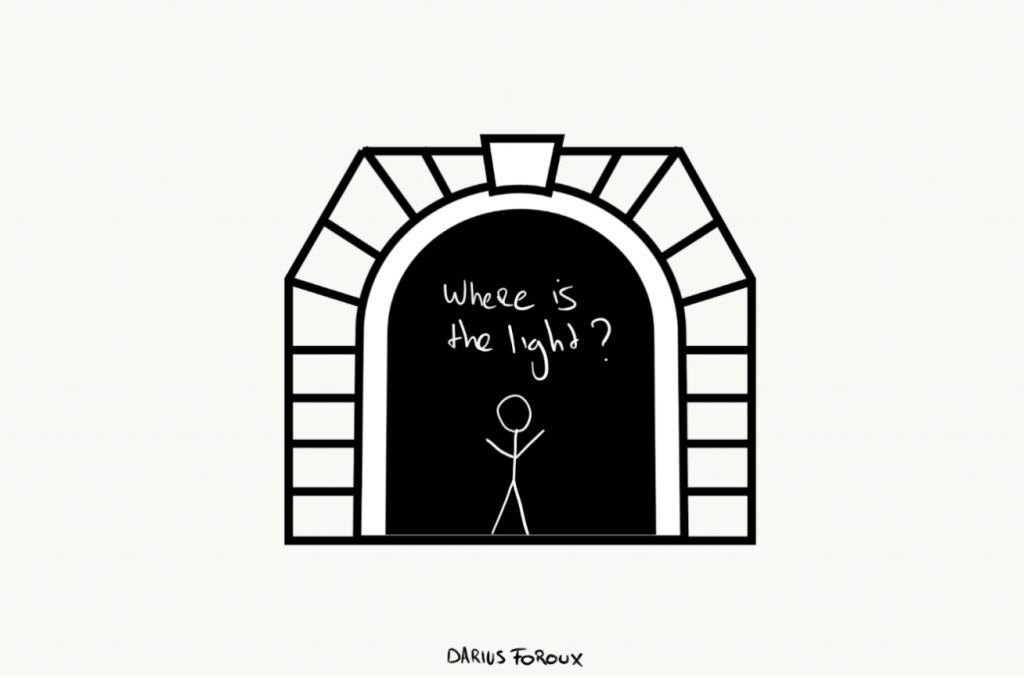
A question I have often asked myself as I near the end of my time at Queen’s University is, what happens after and how do I progress to the next step? As I see the light at the end of this tunnel, I realise it is merely only the beginning of the next stage of my journey.
One of the really good things about our course is the work-based learning module where we get the opportunity, in a very safe environment, to prepare for and experience a simulated job interview.
I will use critical reflection to understand and consolidate my learning from the experience of the simulated interview, as Melanie Jasper states…
‘reflective practice means taking our experiences as a starting point for learning. By thinking about them in a purposeful way – using the reflective processes – we come to understand our experiences differently and take action as a result.’
(2013, 1)
I have chosen the Gibbs Reflective Cycle as my process, so that I prepare myself for life beyond the tunnel.
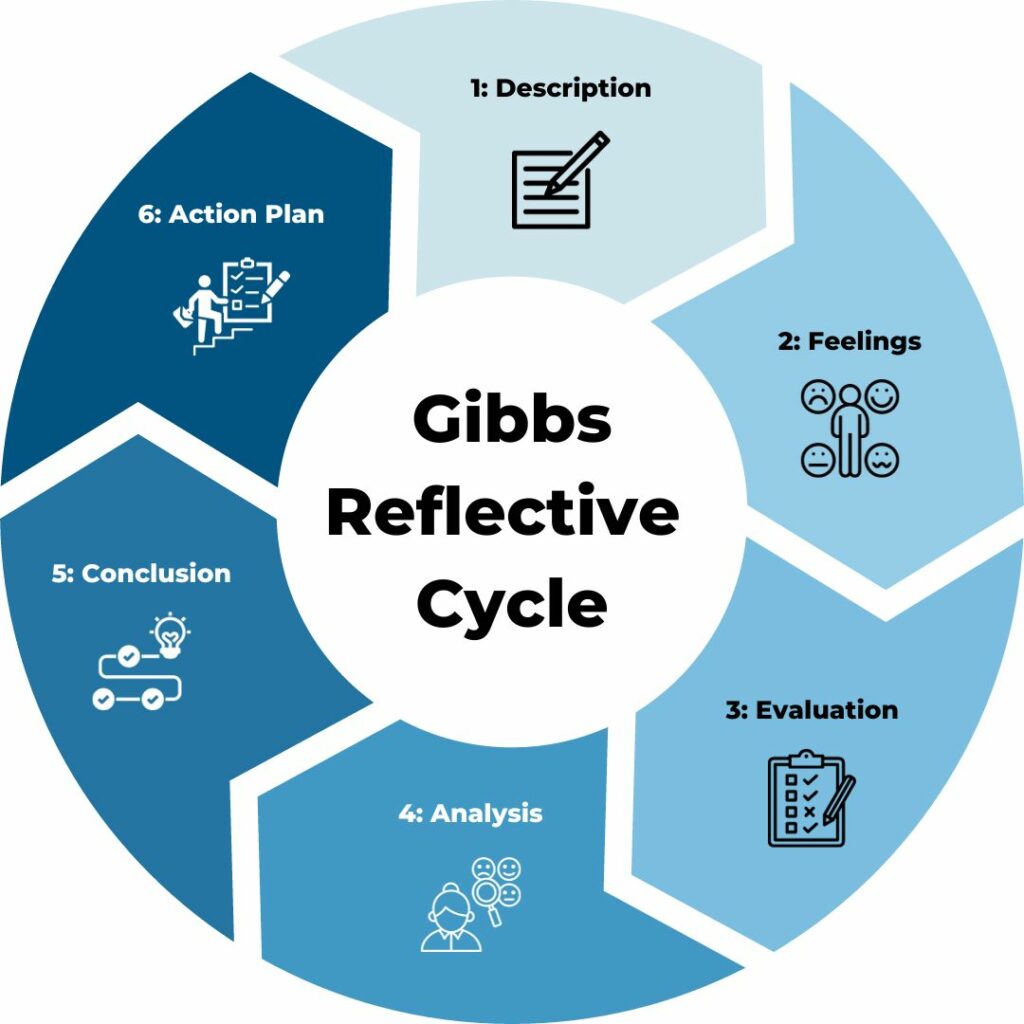
Description
Having decided upon a videographer role at the Panoptic Group, I took a deep dive into the required skills of the job. I copied the specification into a word document, so I could isolate and highlight exactly what the employer was looking for.
Having targeted what was required, it was time to build the foundation of my answers for my interview. I used the highly regarded S.T.A.R method to frame my experiences into answers.

I used a notepad and pen to draft some answers to help with revision. This helped me ready myself for game day and act as a confidence builder.
The five-minute wait outside the interview room felt like an eternity. Being subject to a state of limbo before being put into the firing line, I was eventually called into the room. First question, the nerves disappeared as I the answer I had prepared came to me immediately. After all the negativity in the corridor I was straight into the flow and dynamic of the interview.
I felt I was going well but then one question forced me to act on the spot; it referred to some sound equipment that I wasn’t well enough informed about.
After answering all my questions, I was content and happy to receive feedback for my efforts. As the comments were mainly positive I left feeling more confident in my ability and ready for the next challenge.
Feelings
During the preparation for the interview, I felt as excited as I was nervous. A positive was that no matter how I performed I felt I could only gain from the experience. When preparing my answers for the interview I felt confident in my own ability to articulate them and match the job’s criteria. I assured myself that I had plenty to talk about given that I’d been on work placement, do my own freelance projects and hold a part-time job – all of these provided me with real life examples.
Despite having this confidence in my own ability I felt like I was forgetting something. Like packing a suitcase before a holiday, I had a lingering sense of self-doubt in my overall preparation. However, I remained positive as I geared up for the interview.
The time had come, standing in the corridor awaiting my turn, it was hard to stay still as the nerves were getting to me. This was possibly the most stressful section of the interview experience as I could only think “have I done enough?” or “what if they ask me something I can’t answer?”. When I was called in, I took a deep breath and zoned in ignoring those thoughts as it was now showtime!
After being asked my first question and thinking I had answered it well, I settled and went somewhat into autopilot. I felt confident for most of the interview, but then an awkward question regarding a piece of sound equipment threw me. Despite leaving with positive feedback and a sense of accomplishment that question, and how I reacted, rattled me for the rest of the day. Whilst I felt I’d made a mistake and was frustrated, it was also a good learning experience for my next interview.
Evaluation
One key realisation of the experience was how negative I became as I readied myself for interview. Instead of hyping myself up I took a very “shoulda-coulda-woulda” mindset rather than focusing on what was in my control in any given moment. I should really have been focusing on the task at hand, as I had applied the S.T.A.R methodology and planned accordingly. Despite this I did lock myself into the interview trying to make a good impression from the outset, as Georgina Gregory et al state…
‘Evidence indicates that employers make up their mind about individual candidates for a job within the first minute of a personal encounter.’
(2008 ,53)
Despite my lack of positivity just before I went in, I felt that I effectively portrayed my personality and remained composed for the interview. This was reflected in my feedback which stated that I had “great eye contact and confident body language”. For all the pessimistic dialogue I had with myself beforehand it only took walking through the doorframe to focus on the task at hand.
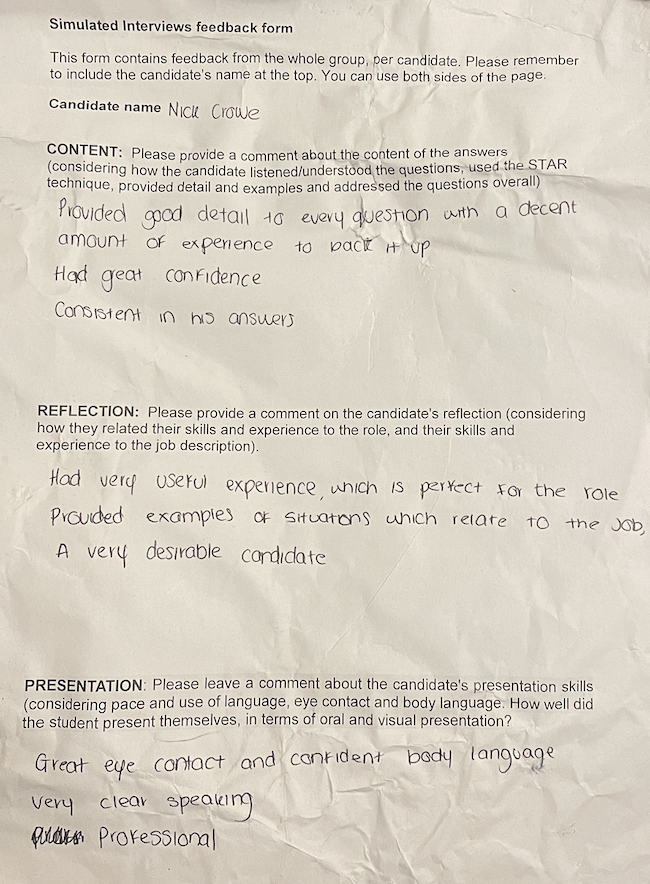
The question which I stumbled on regarding sound equipment was something I just hadn’t thought about. Having prepared reasonably well for the day I thought there was little I had omitted. Despite recovering the question with a previous experience of sound equipment, a gap in my knowledge was revealed. Frustrating but I was pleased I could act on my feet and at least provide an answer that had some relevance.
Analysis
My preparation for the interview was solid as the methods I employed helped to retain my answers. Ros Jay states that…
‘Before you get to the interview, you should already have a mental list of all the most important points you want to make – all the things that will impress on your interviewer that you are the best person for the job’
(2010, 23)
The combination of highlighting key terms on the job description and the writing of my answers on a physical note pad helped massively in building the mental list in my head. The word document remained as a point of reference and jotting my answers in S.T.A.R format helped me add substance to the experiences I had gone through.
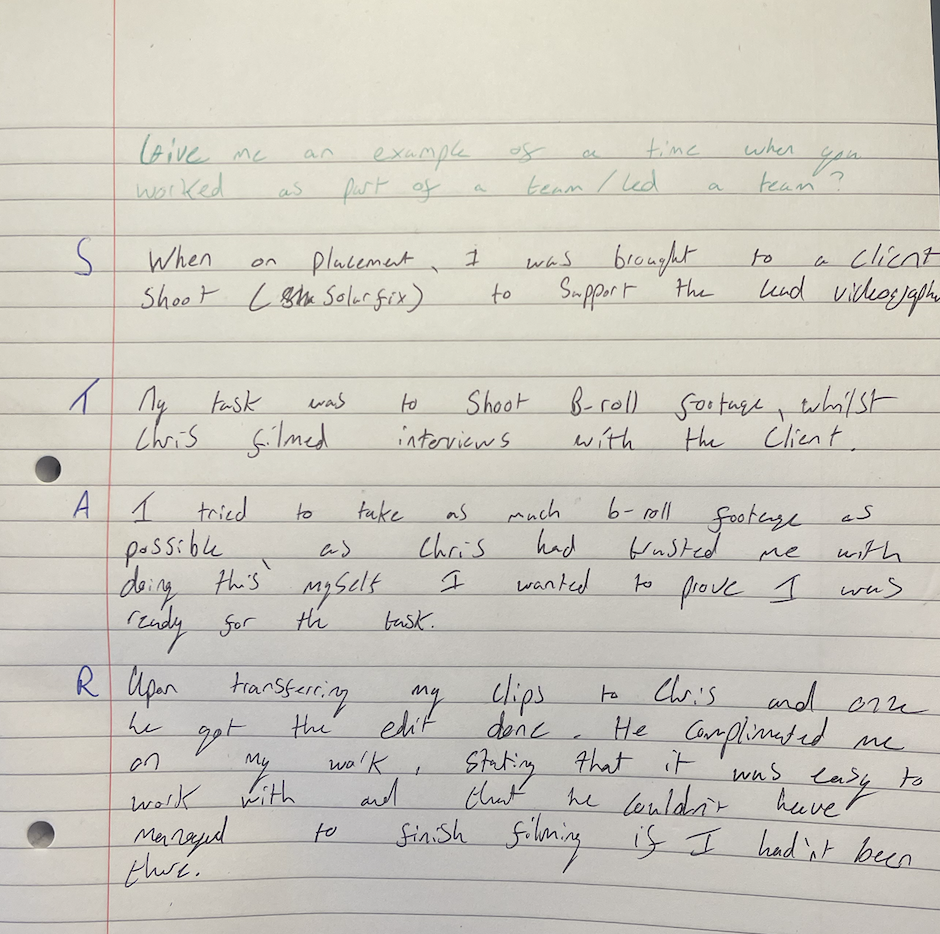
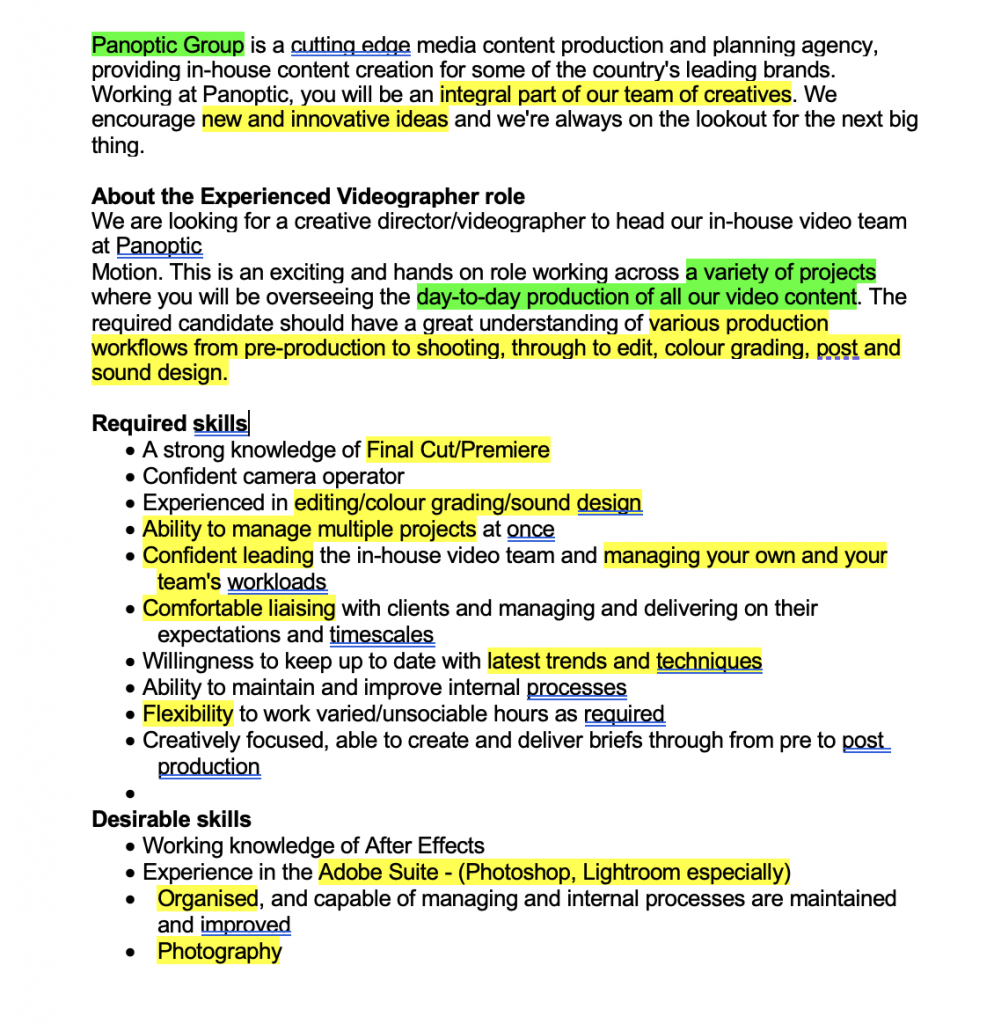
I feel like the solid foundation I set in preparation allowed me to answer in a composed manner. Despite my negativity as I waited to interview, the answers were well stored in my head, so it was only a matter of answering them. I believe it was natural for me to be nervous beforehand but I should have focused on the task at hand instead of looking at the negatives. Once in the interview all those thoughts faded as I could answer with ease upon hearing each question.
Conclusion
To conclude, interviews are like any other skill, the only way you get better is practice. Interviews contain a variety of sub-categories I must learn to improve such as technical or interpersonal traits or just more experience in a chosen field in general.
One of the big positives for me was the method I used in my preparation. I firmly believe my research, revision, note taking and drafting sample answers served me well. Whilst the mechanics of my preparation were good, the scope should have been greater. Had I done more research I wouldn’t have been caught out on the sound question. My approach was good, I just didn’t cover enough material.
I need to believe in myself more prior to the interview. I thought I adjusted to the interview environment well, but I do realise that I must maintain a positive and resilient outlook to the task at hand. Before interviews I should be in control of what I have then opposed to what I don’t have. The corridor before an interview should be a place where I can trust myself and have faith in my own ability noting that…
‘You wouldn’t be on the list unless the interviewer thought – on the basis of your application and CV – that you could do the job they are advertising’
(2010, 6, Jay)
Action Plan
With all said and done there is one quote which has resonated with me after this experience…
“Life is a succession of lessons which must be lived to be understood”
Ralph Waldo Emerson
I realise interviews should be embraced and something that I can’t hide from. I must seek opportunities when they come to put myself in spaces which are uncomfortable in order for me to grow.
Attention to detail is key, I realise that any amount of preparation can be wasted if my attitude and personality don’t compliment my experience on my cv.
I’ll ensure that I cover “too much” rather than “just enough” material for future interviews.
To be positive in my actions, I will not allow negativity to cloud my judgement no matter how prepared I am.
As I see the light at the end of the tunnel, I remind myself that it’s truly only the beginning of my journey. There are plenty of challenges and experiences that await me as I venture into the professional world!
Bibliography
Gregory, G, et al. (2008) Careers in Media and Film : The Essential Guide, SAGE Publications Limited. ProQuest Ebook Central.
Jay, R. (2010) Brilliant Interview: What Employers Want to Hear and How to Say It. 3rd ed. Pearson Prentice Hall.
Jasper, M. (2013) Beginning Reflective Practice. 2nd ed. Melbourne ; Cengage Learning.
Images
[1] Foroux, Darius, (2024), If There’s No Light At The End Of The Tunnel: QUIT. Available at: https://dariusforoux.com/quit/ (Accessed: 8th March 2024).
[2] Channell, Matthew, (2023), Gibbs Reflective Cycle – A Practical Guide. Available at: https://www.tsw.co.uk/blog/leadership-and-management/gibbs-reflective-cycle/ (Accessed: 8th March 2024).
[3] Babington, (2024), The STAR method. Available at: https://babington.co.uk/insights/help-guidance/star-interview-techniques/ (Accessed: 8th March 2024).